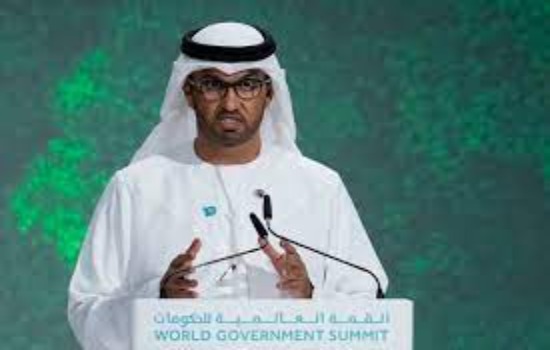COP28: Oil companies pledge to mitigate emissions, transit to zero carbon alternatives
Fifty oil companies representing nearly half of global production have pledged to reach near-zero methane emissions and end routine flaring in their operations by 2030, but environmental groups have called it a “smokescreen”.
Sultan al-Jaber, the president of the United Nations climate summit (COP28) held in Dubai this year, made the announcement on Saturday, saying the pledge included major national oil companies such as Saudi Aramco, Brazil’s Petrobras and Sonangol from Angola and multinationals like Shell, TotalEnergies and BP.
“The world does not work without energy,” al-Jaber said. “Yet the world will break down if we do not fix energies we use today, mitigate their emissions at a gigaton scale and rapidly transition to zero carbon alternatives.”
Methane can be released at several points along the operation of an oil and gas company, from fracking to when natural gas is produced, transported or stored. It persists in the atmosphere for less time than carbon dioxide, but it’s more than 80 times more powerful than the greenhouse gas most responsible for climate change.
Al-Jaber, also the head of the Abu Dhabi National Oil Co, has maintained that having the industry’s buy-in is crucial to drastically slashing greenhouse emissions and limiting global warming.
However, environmental groups were quick to criticise the pledge. It is a “smokescreen to hide the reality that we need to phase out oil, gas and coal”, said a letter signed by more than 300 civil society groups.
Two major emitters of methane, Turkmenistan and Kazakhstan, joined the Global Methane Pledge, a voluntary agreement by more than 150 countries to slash their methane emissions by 30 percent by 2030.
The World Bank on Saturday launched an 18-month “blueprint for methane reduction”, which will set up 15 national programmes aimed at cutting methane emissions from activities like rice production, livestock operations and waste management.
This year, European Union negotiators also reached a deal to reduce methane emissions from the energy industry across the 27-member bloc. The agreement bans routine venting and flaring and mandates strict reporting. By 2027, it will expand those norms to oil and gas exporters outside the bloc.




